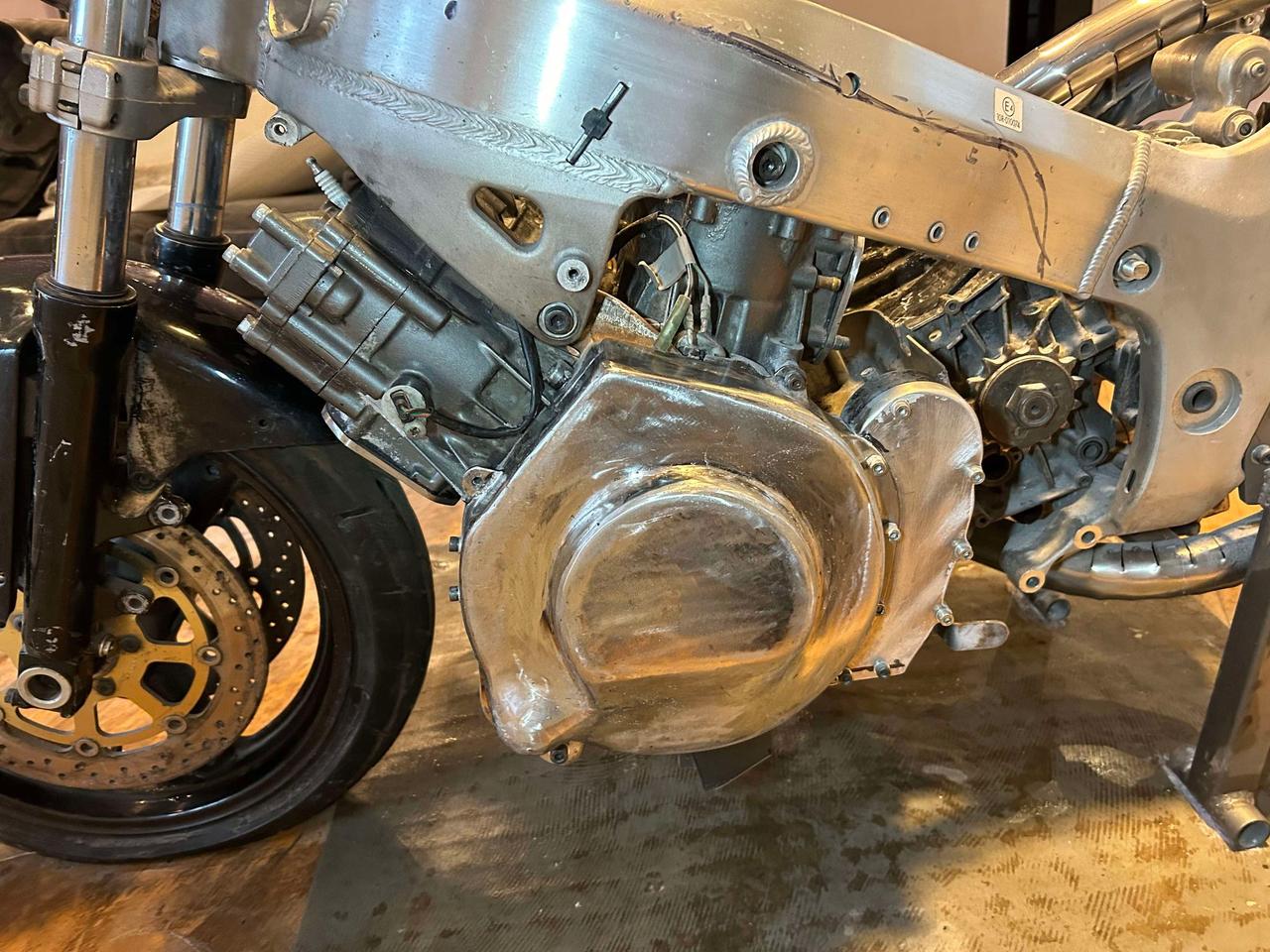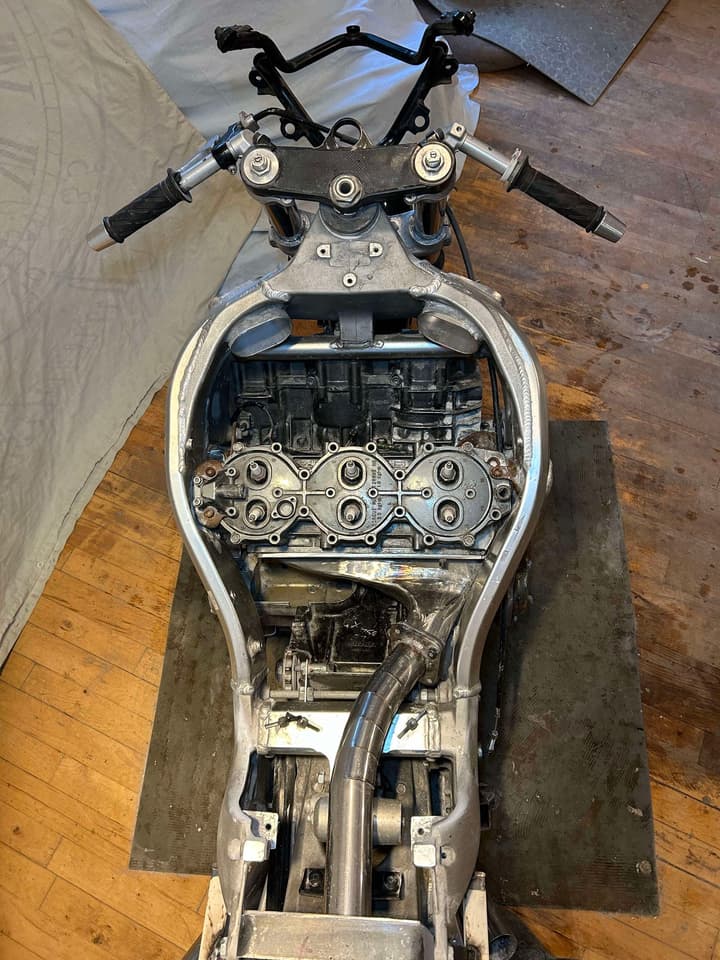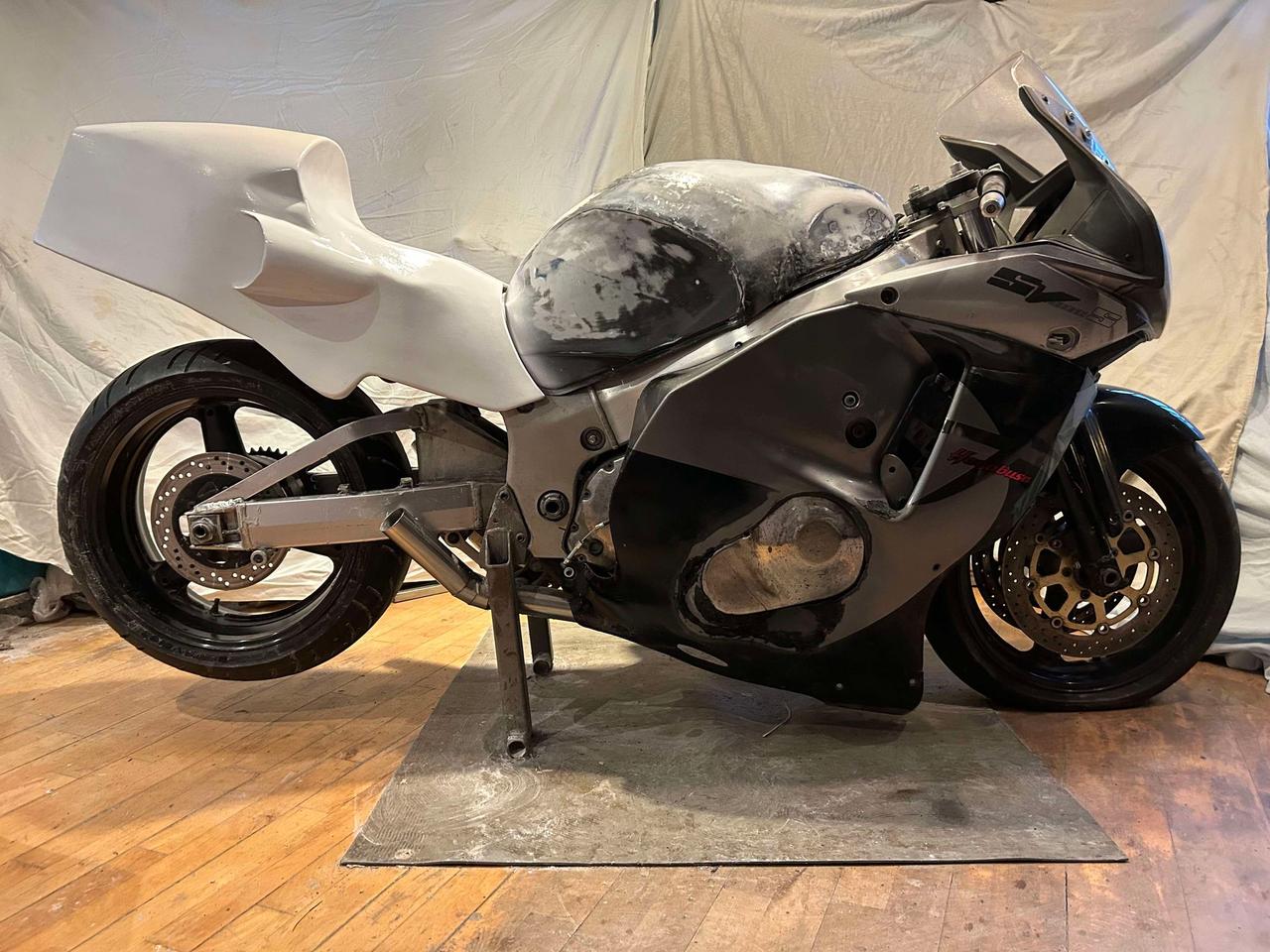We’ve seen some mad Hayabusa custom bikes over the years, but this one’s right out of the box. It ditches the original engine for a massive two-stroke V6, but Meggatech Projects plans to make it look close to a standard Suzuki once it’s finished.
The Hayabusa is one of the most iconic motorcycles ever made – and hardly lacking in power by most standards. Out of the crate, the earliest ‘Busas made around 173 horsepower (129 kW) – an outrageous figure back in 1999 – and given a straight bit of tarmac, they’d do an equally outrageous 312 km/h (194 mph), making them the world’s fastest production bike at the turn of the millennium.
Their 1,299 cc inline 4-cylinder engines were also famously over-engineered; drag racers and street hooligans found most of the components good for well over double the standard power output, so it’s seen a lot of turbochargers and nitro kits over the years, and with money no object, it’s allegedly been tuned up as far as 1,000 hp (746 kW).
The build we see today, though, throws the venerable ‘Busa engine straight out the window for something far scarier.
It’s the work of one Jim Meggat, a retired electrical-mechanical engineer and designer, who used to mechanize, design, and install ABB robots. Now, he builds bikes through an endeavor he calls Meggatech Projects – and this insane machine, still in progress as of the time of writing, has really caught our attention.

Meggatech Projects
The heart of this build is a Suzuki DT225 engine. This 2-stroke 2,700cc V6 is well-known as a reliable, powerful fuel-injected outboard motor for fishing boats. It’s rated at 225 horsepower (168 kW), but the lord only knows how hard those horses come on in a 2.7-liter 2-stroke format.
The DT225 wasn’t the first choice for this build, Meggat tells New Atlas. His heart was initially set on a race-tuned ex-sidecar GT750 motor from the mid-80s. Being a big Suzuki fan, he always liked the two-stroke engines from the 1970s, and he had a soft spot for the old GT range of triples in particular.
He initially bought one such motor with the intention of building it into a complete bike, but it didn’t quite happen for one reason or another. When he did eventually get to it, He chose the readily available GSXR750 SRAD chassis to go with this. But he soon realized that even the race-tuned engine produced less power than the modern 4-stroke unit that it replaced. This, clearly, would not do.

Meggatech Projects
So Meggat considered making his own Frankenstein of a bottom-end to accept three Suzuki RM500 motocross bike top-ends arranged in a V3 formation. It was around this time that he first came into contact with the big two-stroke outboard motors – and the thought of putting one of those in a motorcycle rather tickled him.
By sheer luck, he found a DT225 engine for sale on eBay with low running hours for cheap – partly because it had a badly damaged lower leg, making it much less attractive to boaters.
He bought the outboard with the intention of fabricating his own custom frame around it, but upon running a tape measure over it (and a Hayabusa he had sitting around), he had an idea. What if he could manage to shoehorn this bare engine into one of those frames? So he did what any sensible guy would do… He purchased an old Busa frame from eBay to give it a shot.

Meggatech Projects
The end goal for this build is to achieve something that could at a passing glance be mistaken for a standard machine with a typical ‘Suzuki family’ appearance. Despite the Hayabusa/SV1000S fairings on the mockup above, Meggat’s inspiration for the bike’s final exterior looks currently lies somewhere between the iconic SRAD GSX-R750 and the curvier TL1000.
Meggat was headstrong on having an all-Suzuki setup, and that required a lot of thinking, planning, and tinkering. But it also ought to have the sound, smell, and raw character of the big 2T V6s.
To get the drive running into a Suzuki GSX gearbox, Meggat used a pair of primary gears driving a transverse jackshaft, which in turn carries a third gear to drive a stock GSX1400 clutch and gearbox.
The rest of it, he says, is “fairly standard” other than the 3-into-1 exhaust system, and a reversed and severely cut-down intake manifold that moves the fuel rail and injectors to the front of the engine. A newly fabricated intake plenum fits under the gearbox, fed by ram air from a belly pan-mounted panel filter via the stock throttle bodies.
One area of uncertainty in this setup was the cooling system – obviously, in marine form, the DT225 is cooled by seawater. This open system, with unlimited coolant at ambient temperature, and with a high thermal differential, required only a very low flow rate (to avoid overcooling).
The sealed and pressurized motorcycle system has a much lower thermal differential, and needs both a higher coolant flow rate and effective radiators. Meggat used two front-mounted radiators and a third, larger one mounted under the seat unit, with the coolant circulated by twin electric pumps controlled by thermo-switches.
Most of the rest of the job, he tells us, is just working out the best places for locating the other necessary parts. “The project is still at a very early stage,” says Meggatt, “just having its first ‘dummy build’ to work out the engineering and component arrangements, it will then be fully stripped down and the individual parts completed before surface finishing, painting, and final assembly.”
Enthusiasts like Meggat may be a dying breed in 2024. A lifelong motorcycle lover, he has as much affection for their technical side as for riding them. Meggat lives in Paisley, Scotland. “In my early days,” recalls Meggat, “the heavy engineering was a major employment opportunity, and there were plenty of highly skilled machinists who could make just about anything asked of them. This has all changed now, of course.”
To him, this build is as much about enjoying the journey as reaching the destination. He’s taking his time on this custom bike and is in no rush to reach the finished product. We, on the contrary, can’t wait to see what it finally looks, sounds and rides like!
We ask what he calls this build. “A Suzuki TV27R,” he exclaims proudly. Per Meggat, it’s a simple name reflecting Suzuki’s typical model identification system where ‘T’ is for two-stroke, ‘V’ is for the ‘V’ cylinder arrangement, ‘27’ reflects the capacity in multiples of 100 cc, and ‘R’ denotes race replica.
Go get ’em, Jim! We love your work.
Source: Meggatech Projects
Source of Article